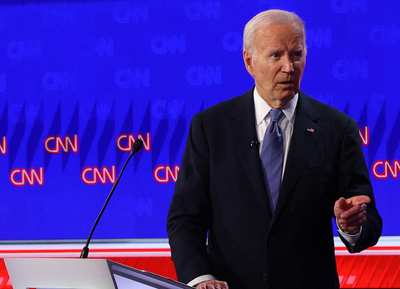Americans anxiously watched the first presidential debate last night, hoping their preferred candidate could prove they have what it takes to (once again) call the White House home. But they got a particularly disappointing show from President Joe Biden, unchecked falsehoods from former President Donald Trump, and two old guys attacking each other’s golf games.
“Biden did not have a good night,” says Eurasia Group’s US director Jon Lieber. “He was sleepy, his voice was raspy, and he made several obvious and notable verbal gaffes.” While Trump was his normal blustery self, “Biden failed to land a single punch,” even when pointing out Trump’s biggest vulnerabilities.
Abortion should have been Biden’s strongest issue after Trump-appointed Supreme Court justices overturned Roe v. Wade in 2022 – which helped Democrats in the midterms later that year. But Biden stumbled in his answer and failed to take remaining time in other questions or in his closing statement to hold his opponent accountable for the increased restrictions on reproductive health.
On other hot-button issues like the economy, immigration, and foreign policy, “Biden’s command of the facts was stronger than that of Trump,” according to GZERO and Eurasia Group’s founder Ian Bremmer, “but no one is looking at the transcript. They're looking at the performance, and his performance was abysmal.”
Will Biden withdraw? Publicly, Democratic officials continue to largely rally around Biden and argue that a lackluster performance doesn’t determine the election. California Gov. Gavin Newsom said after the debate that his party “could not be more wholly unified behind Biden” and that the president should not step aside.
But privately, party insiders report that the whispers about Biden being too old have crescendoed. “Democrats are going to be freaking out for weeks now,” says Lieber. “Expect the speculation about replacing Biden at the top of the ticket to grow to a fever pitch loud enough that Biden will surely hear it – and consider it – in the Oval Office.”
But the decision to withdraw would have to come from Biden himself. Party rules make it almost impossible to replace a nominee without their consent because doing so would amount to party insiders overturning the results of primaries in which Democratic voters overwhelmingly nominated Biden. He won almost 99% of all delegates.
If Biden were to step down, the Democrats would be cast into a brokered convention, or a free-for-all scenario at the Aug. 19 convention in Chicago, where the individual candidates who threw their hat in the ring would have to campaign to try to win a majority of the 700 superdelegates. Historically, brokered conventions aren’t unprecedented, but it’s been 72 years since the last one. Since then, both parties have changed the rules for candidates to avoid this situation, primarily because a nominee in a brokered convention rarely goes on to win the general election.
Trump’s answers were littered with falsehoods, including that the Charlottesville rally of white supremacists never occurred (it did) and an accusation that Biden is a “Manchurian candidate” who is “paid by China” – a nod to accusations that Biden’s unduly influenced by China, for which there is no evidence – but the former president spoke clearly and was easier to understand. Biden, meanwhile, largely failed to hammer Trump on his recent felony convictions or his attempt to overturn the election – besides accusing Trump of having “the morals of an alley cat.”
The country, Bremmer contends, deserves better from its presidential candidates. “A country as strong as America,” he says, “should be able to run a much more effective campaign with people that we admire.”
For more analysis of the debate, check on Ian Bremmer’s QuickTake here.
